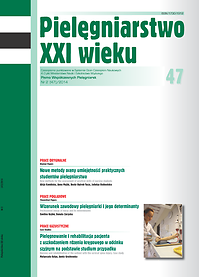Eating habits and the health locus of control among students of medicine
DOI:
https://doi.org/10.12923/Keywords:
health locus of control, eating habits, university studentsAbstract
EATING HABITS AND THE HEALTH LOCUS OF CONTROL AMONG STUDENTS OF MEDICINE
Introduction. The health locus of control plays an important role in health behavior. It is characterized by believing in the ability to influence and improve one’s health in both internal and external terms. Nutrition is vital to maintaining health throughout ontogenesis, and eating habits developed at a young age frequently have an impact on later stages of one’s life. University students are especially at risk of developing non-healthy behaviors.
Aim. To establish the relationship between eating habits and the health locus of control among students of medicine.
Materials and methods. The study covers a group of 104 subjects aged 24-27 selected from among 6th year students of the Faculty of Medicine at the Medical University of Lublin, and 2nd year students of the Faculty of Medicine at the Medical University of Warsaw. The survey was carried out using the Multidimensional Health Locus of Control scale, version B (MHLC-B), as developed by Z. Juczyński, to investigate the generalized expectations in three dimensions of health locus of control, namely internality, powerful others externality, and chance externality. Eating habits of the subjects were assessed on the basis of the point-based nutritional assessment, as developed by Starzyńska, with some own modifications.
Results. The study results indicate that in the examined group of students the internal dimension of health locus of control has the highest impact on health. For male subjects all three dimensions were of considerable significance. Students from rural areas attributed more importance to the internal dimension of health locus of control, while subjects living at their family house throughout their university education considered powerful others externality as more important. Statistical analysis of these data showed poor negative correlation between nutritional assessment and internal health control (r=-0.19; p=0.05).
Conclusions. Among the studied group of students, the internal health locus of control predominates.
References
1. Wrzesińska MA, Opuchlik K, Kocur J. Ocena umiejscowienia kontroli zdrowia u chorych na stwardnienie rozsiane. Post Psychiatr Neurol. 2008; 17(4): 313-318.
2. Basińska MA, Maćkowska P, Listwan A. Przekonania o umiejscowieniu kontroli zdrowia u chorych na cukrzycę typu 1 a zachowania zdrowotne. Diabetol Prakt. 2011; 12(4): 151-159.
3. Rotter JB. Poczucie wewnętrznej versus zewnętrznej kontroli wzmocnień. Nowiny Psychol. 1990; 5-6: 59-70.
4. Fiszer K, Sobów T. Związek umiejscowienia kontroli zdrowia z depresyjnością studentów uczelni medycznej. MONZ. 2013; 19(3): 294-299.
5. Ogińska- Bulik N. Zasoby osobiste w radzeniu sobie ze stresem. Zeszyty Naukowe WSHE. 2008; 8(13): 93-103.
6. Dolińska- Zygmunt G. Elementy psychologii zdrowia. Wrocław: Wyd. UW; 1996.
7. Juczyński Z. Przekonania i oczekiwania wyznacznikami zachowań związanych ze zdrowiem. [w:] Zasoby osobiste i społeczne sprzyjające zdrowiu jednostki. Juczyński Z, Ogińska- Bulik N. (red.). Łódź: Wyd. UŁ; 2003: 49-61.
8. Juczyński Z. Narzędzia pomiaru w promocji i psychologii zdrowia. PTP, Warszawa 2001.
9. Jachimowicz V, Gawłowicz K, Juszczak K. Poczucie własnej skuteczności i umiejscowienie kontroli zdrowia a palenie papierosów wśród pielęgniarek. Prz Lek. 2011; 68(10): 879-882.
10. Wojtczak A. Zdrowie publiczne wyzwaniem dla systemów XXI wieku. Warszawa: PZWL; 2009.
11. Lisicki T, Walentynkiewicz A. Żywienie jako przejaw stylu życia studentów kończących studia, [w:] Prozdrowotny styl życia. Uwarunkowania społeczne. Lisicki T, Wilk B, Walentynkiewicz A. (red.), Gdańsk: AWFiS: 2005.
12. Gawęcki J, Hryniewiecki L. (red.) Żywienie człowieka. Podstawy nauki o żywieniu. Warszawa: Wyd, Naukowe PWN; 2000.
13. Bandura A. Health Promotion by Socjal-Cognitive Means. Health Educ Behav. 2004; 31: 143-164.
14. Kościelak R. Poczucie umiejscowienia kontroli i przekonania o własnej skuteczności w zdrowiu i chorobie. Kraków: Impuls; 2010: 46.
15. Norma P, Bennet P. Health locus of control. In: Predicting health behaviour. Ed Conner M, Norman P, Open Uniwersity Press. Buckingham 1996: 62-94.
16. Schwarzer R. Social-cognitive factors in changing health-related behavior. Curr Dir in Psychol Sci 2001; 10: 47-51.
17. Bishop GD. Psychologia zdrowia. Wrocław: Astrum; 2000.
18. Czarnecka M, Cierpiałkowska L. Naukowe a subiektywne koncepcje zdrowia i choroby wśród studentów i ich determinanty. Now Lek. 2007; 76(2): 161-165.
19. Strzelecki W, Cybulski M, Strzelecka M. Rola poczucie umiejscowienia kontroli w kształtowaniu wybranych zachowań zdrowotnych adolescentów. Now Lek. 2009; 78(1): 18-22.
20. Olędzka R, Kozłowska B, Wiśniewska J, i wsp. Ocena jakościowa i ilościowa sposobu żywienia studentów Wydziału Farmaceutycznego Akademii Medycznej w Warszawie w zależności od roku studiów i miejsca zamieszkania w latach 1997/1998 i 1999/2000. Bromat Chem Toksykol. 2002; 35(4): 315-322.
21. Krajewska A, Słowiek-Gabryelska A. Ocena jakości żywienia studentów pierwszego roku zdrowie publicznego US. Zesz Nauk U Szczec. Prace Instytutu Kultury Fizycznej 2008; 25: 5-13.
22. Rasińska R. Nawyki żywieniowe studentów w zależności od płci. Now Lek. 2012; 81(4): 354-359.
23. Misiarz M, Malczyk E, Złoteńska-Synowiec M, i wsp. Ocena zachowań żywieniowych studentów kierunków medycznych i niemedycznych z województwa świętokrzyskiego. Piel Zdr Pub. 2013 3(3): 265-272.
24. Basińska MA, Zalewska-Rydzkowska D, Junik R, i wsp. Przewidywanie stosowania się do zaleceń dietetycznych przez chorych na cukrzycę typu 1 – związek z umiejscowieniem kontroli zdrowia. Diabetol Prakt. 2007; 8(11): 419-424.
Downloads
Published
Issue
Section
License
Copyright (c) 2014 Honorata Piasecka, Grzegorz Nowicki, Barbara Ślusarska (Autor)

This work is licensed under a Creative Commons Attribution 4.0 International License.




